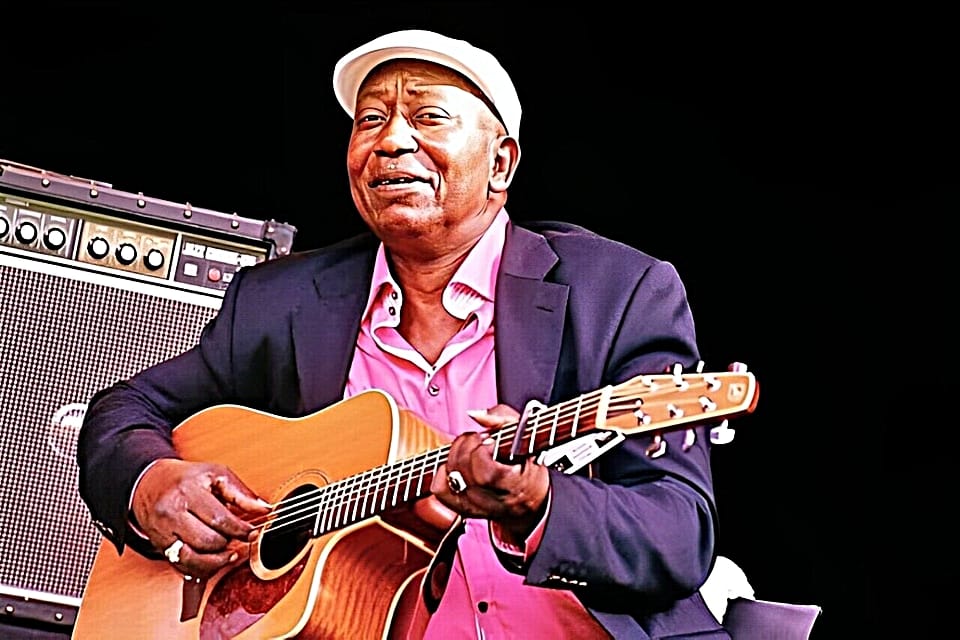
The Birth of a Legend: Papa Noel Nedule’s Early Life
Born Antoine Nedule Monswet on December 25, 1940, in Leopoldville (now Kinshasa), Papa Noel’s stage name reflects his Christmas Day birth. Growing up in the bustling capital of the Belgian Congo, Papa Noel was exposed to a rich tapestry of African music, as well as the Cuban sounds that heavily influenced Congolese rumba. His upbringing in such a dynamic environment shaped his musical identity, propelling him toward the global stage.
Master of the Guitar: A Career in Music
Papa Noel Nedule is best known for his mastery of the guitar, particularly during the golden age of Congolese rumba. He emerged as one of the most prominent guitarists, composers, and arrangers in African music, with his distinctive style blending African rhythms with Afro-Cuban beats. His expert command of melody and rhythm positioned him as a crucial figure in shaping the evolution of soukous, a genre born from Congolese rumba and known for its fast-paced, infectious rhythms.
Iconic Hits: Papa Noel’s Musical Contributions
Papa Noel is credited with composing several memorable tracks that continue to resonate with fans of Congolese music. One of his standout compositions, “Tangawisi,” was recorded while he was a member of the iconic TPOK Jazz band. Other well-known tracks in his discography include “Bon Samaritain,” “Malou,” “Juliana,” “Lolita,” and “Kizungu Zungu,” all of which solidified his reputation as a talented composer. His songs capture the essence of soukous, fusing intricate guitar lines with lively rhythms and infectious melodies that continue to define the genre.
Crossing Borders: Papa Noel and Afro-Cuban Fusion
Though Papa Noel’s early works focused heavily on Congolese rumba and soukous, his 2007 album Café Noir marked a significant point in his career. This cross-border collaboration brought African and Cuban rumba into the 21st century, blending the two musical traditions in an innovative way. Café Noir served as a celebration of the deep connections between African and Cuban music, reaffirming Papa Noel’s role as a global ambassador of African musical heritage.
Behind the Scenes: The Quiet Genius of Papa Noel
Though Papa Noel was primarily known as a guitarist and composer, he often took a background role on stage rather than the spotlight as a lead vocalist. This humility allowed him to focus on his craft, contributing to the richness and depth of Congolese music while letting others take center stage. His influence as an arranger and composer, however, remained undeniable, as his guitar work was a crucial element in shaping the sound of both rumba and soukous.
A Lasting Influence: Papa Noel’s Impact on Congolese Music
With a career spanning multiple decades, Papa Noel has played a vital role in defining the sound of Congolese music. His unique guitar technique and compositional style have been instrumental in shaping the sound of soukous and Congolese rumba. His work influenced a generation of musicians, from his contemporaries in bands like TPOK Jazz to younger artists looking to preserve the legacy of African popular music. As a veteran of the music scene, Papa Noel’s contributions have made him an enduring figure in African music history.
Staying Relevant: Papa Noel in Recent Years
Even in his later years, Papa Noel remains connected to his audience. Based in France, he made headlines in February 2024 for reasons unrelated to music, appealing to his fans through public announcements. While the specifics of his appeal were not disclosed, this demonstrates his continued relevance and enduring relationship with his fans. Despite stepping back from the spotlight, Papa Noel remains a beloved figure, embodying the heart of Congolese music.
A Musical Legacy That Bridges Generations
Papa Noel Nedule’s career serves as a bridge between the early days of Congolese rumba and the modern soukous sound. His innovative guitar work and timeless compositions have left a lasting legacy in African music. From his early days in Leopoldville to his international collaborations, Papa Noel’s influence can still be felt in the rhythms of today’s African music, cementing his place as a key figure in the history of Congolese and global music.



